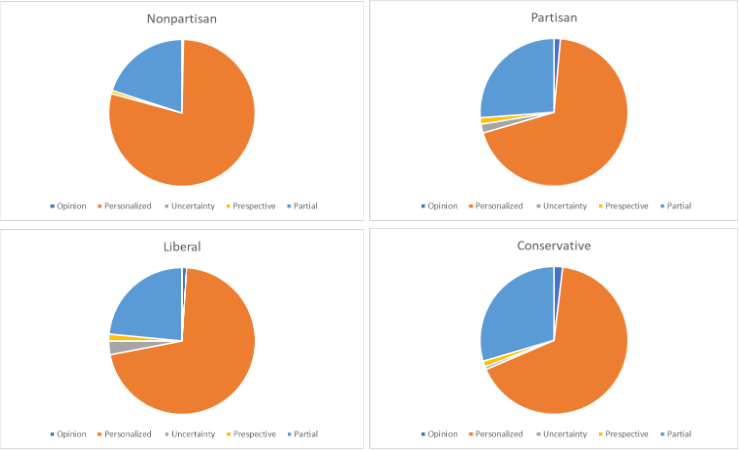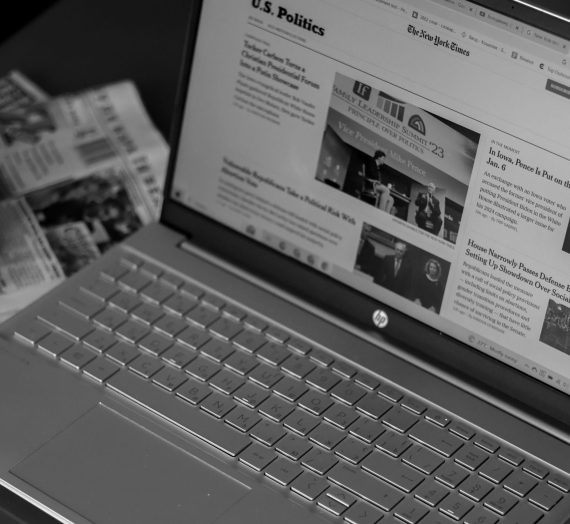Disclaimers are used to avoid assumptions being made about the speaker, especially in relation to the speaker’s beliefs or opinions. How does the use of conversational disclaimers in political podcasts showcase opinions when compared to podcasts with no political affiliation?
Disclaimers are a language feature that inform an audience that a specific assumption should not be made in relation to whatever content is being presented. They can be used in all kinds of ways. When you watch a video or read an article, sometimes they start with a disclaimer about the author or about the content, sometimes helping people decide whether the content is appropriate for specific audiences.
Further, when you are talking to a friend or writing an essay, you might add a conversational disclaimer about a stance or opinion that you plan to take, possibly softening the blow of bad news or helping to frame the statement in the way you want it to be interpreted.
Finally, disclaimers are a way to keep discourse civil while discussing complex topics that could otherwise lead to contention. For example, people sometimes precede opinions with a disclaimer so that listeners know that what follows is not a statement of fact. This can help keep discourse civil by not forcing statements to be black and white. The thing that makes certain topics controversial is that they do not have one easy answer. Disclaimers can help people discuss these topics without giving the impression that the opinion they are expressing is the factual truth about the topic.
Finding Disclaimers in Actual Discourse
When it comes to modern language, a common place to find conversational disclaimers is in controversial discourse. Where can this kind of language be found on the internet? Videos, interviews, and podcasts are definitely a good start.
I decided to take a look into how conversational disclaimers in political podcasts are used. These are all questions that I set out to answer:
- Does the political affiliation, or lack thereof, affect how often a podcast utilizes a conversational disclaimer?
- Does the use of disclaimers in political podcasts differ based on political affiliation?
- Do they use a specific kind of disclaimer more than the other?
Collecting Transcripts from Podcasts
From Youtube, I gathered a collection of transcripts from both nonpartisan podcasts as well as podcasts that have a known political affiliation, from both sides of the political spectrum. I, then, scanned through them looking for a number of different conversational disclaimers.
The collection I gathered consists of ten nonpartisan podcasts, and twelve affiliated podcasts, six from each side of the spectrum. To find these podcasts I used helpful lists of nonpartisan, conservative, and liberal podcasts. I gathered one transcript each from the podcasts that I could find from these lists. I sorted the gathered transcripts into their appropriate corpus. Although they do all differ in word count, all of the analysis that I did used the normalized frequencies, so that they could be compared fairly. The nonpartisan corpus consists of 57,757 words, and the partisan corpus consists of 105,292 when the liberal corpus of 49,775 words and the conservative corpus of 55,517 words are added together.
Using the Antconc program, I was able to search for a number of different disclaimers within the text of the transcripts. The disclaimers that I searched for can be separated into five different categories that I inductively created when I realized how similar many of the disclaimers I was searching for were. I titled those different categories as opinion disclaimers, personalized disclaimers, uncertainty disclaimers, perspective disclaimers, and partial disclaimers.
- Opinion disclaimers are determined by the way that they point out a statement is an opinion and not a fact. The most common example of this type of phrase is in my opinion.
- Personalized disclaimers are phrases that consist of I-statements, things like I think or I feel. I named these personalized disclaimers because they remind the audience that whatever follows is the personal understanding of the speaker.
- Uncertainty disclaimers are defined by carrying a word that specifically communicated uncertainty. An example of this is the phrase I could be wrong. This phrase helps listeners know that the speaker is not positive in what they are about to say and are open to the possibility of it being incorrect.
- Perspective disclaimers rely on the understanding that people understand things according to their perspective, and if people disagree with them, the perspective is what is to blame. Examples of this include as far as I know or from what I understand.
- Partial disclaimers are often the shortest and in some ways, the weakest. The purpose of all disclaimers is to add an air of uncertainty and these disclaimers do that in the least noticeable way when compared with the other types of disclaimers. A lot of the phrases that I put in this category were just one word. For example, this category included maybe, perhaps, and seemingly.
Being able to separate these disclaimers into different categories helped to bring in even more insights during the analysis of the results.
Does the political affiliation, or lack thereof, affect how often a podcast utilizes a conversational disclaimer?
As suggested in the introduction of the article, disclaimers are used to prompt assumptions from being made about the speaker, especially in relation to the speaker’s beliefs or opinions.
Podcasters that are advertising themselves as nonpartisan could be more likely to utilize disclaimers because, with their purpose of trying to stay nonpartisan and moderate, it is important that they do not let their opinion overtake the conversation. The audience is not expecting to listen to the podcasters to go off about their opinions and their take on the news—they are expecting to hear the facts.
The numbers that I found reflect this. The nonpartisan podcasts had a higher frequency of disclaimers in their transcripts than the partisan podcasts did. There is a lower number of occurrences of disclaimers in political podcasts.

Does the use of disclaimers in political podcasts differ based on political affiliation?
Because political discourse is so charged these days, I looked further into the partisan podcasts to see if there were any differences in the use of disclaimers. I split the partisan podcasts into liberal affiliations and conservative affiliations, and what I found was that liberal podcasts seem to use much more disclaimers than conservative podcasts did.

There were a good number of disclaimers found in both of the corpora, but the corpus of transcripts from podcasts associated with the liberal political affiliation had over ten more occurrences per 10,000 words than the corpus of conservative podcast transcripts.
Do different types of podcasts use a specific kind of disclaimer more than the other?
The different types of disclaimers that I looked into all have slightly differing purposes in the way that they display the beliefs of the speaker. Because of this I thought it might be interesting to look into how these different disclaimers are used by these different types of podcasts. What I found was less of a difference between the type of podcasts and more of a difference between the popularity in the type of disclaimer used.
Whether comparing partisan podcasts to nonpartisan podcasts or liberal podcasts to conservative, the proportions of the different types of disclaimers stay the same. This is seen in these pie charts.

In these pie charts there are some slight differences in the proportions, but in every single pie chart, the majority of disclaimers are personalized, and the second most used disclaimer was partial. These two types of disclaimer are the least wordy. The personalized category consists of two word phrases (I think or I feel) and the partial category includes many one word and two word phrases (maybe, perhaps, and seemingly). Every other category consists of phrases that are four words or more.
The type of disclaimers the podcasts employ appears to have less to do with the nature of the content and more to do with the amount of words in the phrases themselves.
If our goal online is to have edifying and educating conversations, it is important to be aware of what things are facts and what things are opinions. When we want to communicate that our statements are opinions, we can use disclaimers.
Importantly, podcasts seeking to be nonpartisan appear to be more likely to use conversational disclaimers. Disclaimers thus appear to be good tools to accomplish the goal of nonpartisanship. If this is a goal in your personal online discourse, I encourage you to utilize these disclaimers in appropriate situations. Please let us know in the comments how it goes!
-Marley Matthews
FEATURE IMAGE BY GEORGE MILTON




